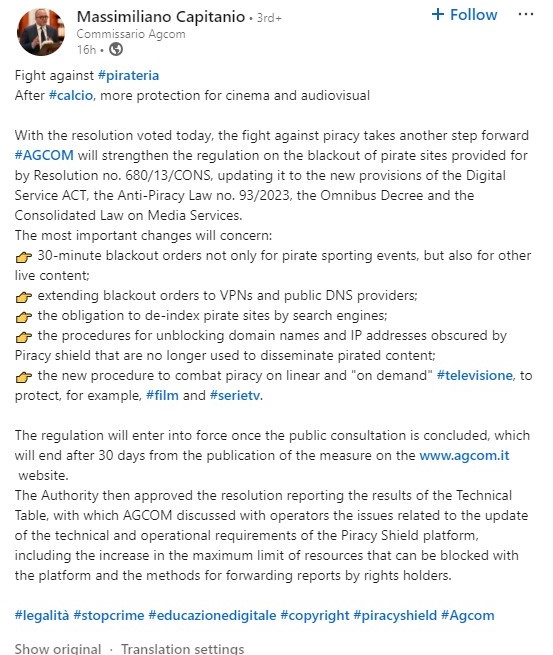Italy to require VPN and DNS providers to block pirated content
The new measures are set to be added to the country's Piracy Shield

Italy is set to require VPN and DNS providers to block access to pirated content within 30 minutes – whether that's a football match or any other live event, on-demand movies and TV series included.
The country's communication regulator AGCOM approved the new anti-piracy measures on Tuesday, February 18, 2025, in a major boost to the existing anti-piracy system. Italy enforced the so-called Piracy Shield early last year specifically to fight against live sports piracy mostly via IP blocking.
The news comes as French streaming giant Canal+ is considering blocking VPN usage to prevent citizens from circumventing the country's anti-piracy tactics. Some of the best VPN providers on the market, however, are arguing that targeting their services risks undermining people's internet freedom rather than solving online piracy.
What is Italy's Piracy Shield?
Italy enforced its Piracy Shield system in February 2024 to prevent citizens from accessing live sports events through pirate sites, especially football matches. To do so, rightsholders can demand piracy-related domain names and IP addresses suspected of copyright infringement are blocked within 30 minutes.
While the Italian anti-piracy system has proven effective so far, tech companies have been raising concerns with EU authorities about multiple overblocking incidents.
Yet, industry criticism wasn't enough to stop AGCOM's mission. The country's communication regulator now wants to expand the reach of its Piracy Shield system even further to tackle the piracy plague affecting the movie and audiovisual industries.
As the AGCOM commissioner, Massimiliano Capitanio wrote in a LinkedIn post on Tuesday: "With the resolution voted today, the fight against piracy takes another step forward."

Online piracy and VPNs
Among the new AGCOM measures, "extending the blocking order to VPNs" is surely the one set to create the most discussions.
A virtual private network (VPN) is security software that encrypts all internet connections and spoofs the users' real IP address. While most people use VPNs in Italy and beyond to boost their online privacy, their IP-spoofing abilities also enable users to bypass anti-piracy restrictions.
This is exactly why French rightsholders have presented the likes of ProtonVPN, NordVPN, ExpressVPN, Surfhsark, and CyberGhost with legal action, seeking to block VPN access to people looking to infringe the country's copyright laws.
The targeted VPN firms plan to fight back against France's streaming giant's request, deeming the lawsuit "illogical" and warning this would have "sweeping consequences" for the internet security and privacy of people in France.
On its side, Italy has not shared how the VPN providers are expected to meet the new requirements. Nor it is clear if this would be technically feasible for companies operating no-log VPNs, which cannot supposedly see what users are doing when connected to their service.
We have contacted some of the most popular VPN providers asking for comments and will update the page accordingly.

Chiara is a multimedia journalist committed to covering stories to help promote the rights and denounce the abuses of the digital side of life – wherever cybersecurity, markets, and politics tangle up. She believes an open, uncensored, and private internet is a basic human need and wants to use her knowledge of VPNs to help readers take back control. She writes news, interviews, and analysis on data privacy, online censorship, digital rights, tech policies, and security software, with a special focus on VPNs, for TechRadar and TechRadar Pro. Got a story, tip-off, or something tech-interesting to say? Reach out to chiara.castro@futurenet.com
You must confirm your public display name before commenting
Please logout and then login again, you will then be prompted to enter your display name.